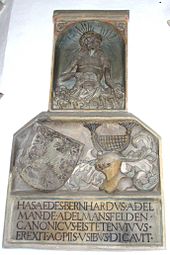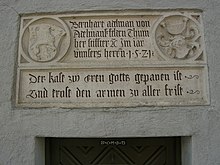Bernhard Adelmann from Adelmannsfelden
Bernhard Adelmann von Adelmannsfelden (also Bernhardus Adelman de Adelmansfelden ; born May 27, 1459 in Schechingen or Neubronn near Aalen; † December 16, 1523 in Eichstätt ) was a German humanist .

origin
Bernhard's father was Georg Adelmann von Adelmannsfelden , Lord of Schechingen and Neubronn († July 20, 1512), who was in the service of Margrave Albrecht of Brandenburg in 1450 . The mother Brigitta († December 5, 1503) was a daughter of the Franconian noble family von Leonrod , which for a long time held one of the hereditary offices in the bishopric of Eichstätt. This connection also gave the sons access to canonical gates of the Eichstätter cathedral. The marriage resulted in 14 sons and 4 daughters, including Johann, German Master of the Teutonic Order († February 17, 1515), Wilhelm, as a combat and feud-loving knight in margravial and later ducal Bavarian service († 1495) , Melchior and Markus, both in the service of the Bavarian Duke Albrecht, and finally Kaspar , Konrad and Bernhard.
Educational path
It is not known exactly where he grew up and received his first education. After studies in Heidelberg (1472), where he already registered as "canonicus ecclesie Eystetensis", Basel (1476-77), where he met Johannes Reuchlin , in Italy (probably like his brother Konrad in Ferrara ) (1482), where he became friends with the Bohemian humanist Bohuslaus Lobkowicz von Hassenstein , and after a stay in Rome he took up his canon in Eichstätt in 1486 under Prince-Bishop Wilhelm von Reichenau .
The canon in the Reformation dispute
In 1492 Bernhard undertook a trip with an embassy to Henry VII , King of England, on behalf of the Prince-Bishop , in order to bring him relics of the Eichstatt diocesan saints. When Bernhard returned happily, as a thank you to the Collegiata parish church, he gave a little silver supporting altar made by the Augsburg master Georg Seld , which was in 1900 in the royal treasury in Munich. The successor of his employer Wilhelm von Reichenau († 1496) on the Eichstätter bishop's chair was Bernhard's cousin Gabriel von Eyb . The two were united by a deep friendship that was also religious.
In 1498 he was also canon and provost of St. Gertraud in Augsburg . In 1505 the new Augsburg prince-bishop Heinrich von Lichtenau gave him the office of "summus scholasticus" and thus the supervision of the clergy at the cathedral school. From 1486/87 he was also canon in Ellwangen . In 1512 he represented the bishop of Eichstätt at the Reichstag in Trier and Cologne, in which his brother, the German master Johann Adelmann, also took part. In 1513, Bernhard founded a hospital for Eichstätter, who suffered from rampant syphilis , which, after the epidemic subsided in 1516, was continued as the Sebastian Brothers House (with a grain box from 1521) until secularization .
Adelmann was part of the Augsburg humanist circle around Konrad Peutinger , the “Societas Augustana” or “Sodalitas litterarum”. This was a literary cooperative to promote historical studies, which he joined in 1507 at the latest. Bernhard was a pupil of Johannes Reuchlin and friends with Willibald Pirckheimer , the Augsburg Benedictine Veit Bild and the Ottobeurer Benedictine Nikolaus Ellenbog . He was in lively correspondence with Martin Luther . On October 7, 1518, Bernhard got to know him personally at the Reichstag in Augsburg. His enthusiasm for Luther led him to take sides with his “good Martin”. He left him the 18 comments (obelisks) on Luther's theses by the Ingolstadt professor Dr. Johannes Eck via Nuremberg. Eck had written it for the Eichstatt Bishop. The hostility of the two culminated in the fact that Eck drove forward negotiations against Luther and his supporters in Rome and returned to Germany in 1520 with Pope Leo X.'s bull threatening the ban "Exsurge Domine" . Bernhard Adelmann's name was also listed in it, out of private desire for revenge, but legitimately added. After the Eichstatt Bishop had the bull published in his diocese ten days after delivery, Adelmann did not want to let it come to an extreme and obtained Eck's absolution within the set 60-day period, whereupon he did not fall under the ban . From then on he behaved at least outwardly obedient to the Roman Church; Inwardly, he continued to feel connected to the Luther cause and, for example, in March 1521 recommended the Luther cause to God's protection. Despite the revocation, in 1523 he took Urban Rhegius, who had been expelled from Austria for heretical activities, into his house. In July, five months before his death, he regretted Willibald Pirckheimer that Philipp Melanchthon intended to give up his literary work.
Bernhard Adelmann von Adelmannsfelden did not write any writings, but numerous letters from him in good Latin style to important humanists have survived. Probably died in Eichstätt, he was buried in the Sebastian chapel of his brother's house. A memorial plaque to him, which was attached to the Bruderhaus, is today in the mortuary of Eichstätter Cathedral.
Library
The Frankfurt bibliophile Georg Kloß noted in a letter from 1835 that he had acquired Adelmann's almost complete library. The von Kloß collection was auctioned at Sotheby’s in London in 1835 .
It was not until 2005, when the catalog of the incunabula of the Bodleiana was published , that the Schwäbisch Gmünd Franciscan monastery had acquired Adelmann's library at an unknown date. All volumes from the Franciscan monastery in the Bodleiana come from Kloß's previous ownership. Some of these pieces contain personal entries from Adelmann's possession. Two entries say explicitly: Pertinet ad PP Franciscanos Gamundiae ex Bibliotheca Adelmannica empta . Obviously, the Adelmann library did not reach Kloß directly, but via the detour via the Schwäbisch Gmünder Franciscan monastery - which he kept secret.
literature
- Ludwig Geiger: Adelmann von Adelmannsfelden, Bernhard . In: Allgemeine Deutsche Biographie (ADB). Volume 1, Duncker & Humblot, Leipzig 1875, p. 79.
- Georg Sigmund Count Adelmann von Adelmannsfelden: Adelmann von Adelmannsfelden, Bernhard. In: New German Biography (NDB). Volume 1, Duncker & Humblot, Berlin 1953, ISBN 3-428-00182-6 , p. 60 f. ( Digitized version ).
- Friedrich Wilhelm Bautz : ADELMANN of Adelmannsfelden. In: Biographisch-Bibliographisches Kirchenlexikon (BBKL). Volume 1, Bautz, Hamm 1975. 2nd, unchanged edition Hamm 1990, ISBN 3-88309-013-1 , Sp. 35-36.
- Riederer: Contribution to the Reformation documents . Altdorf 1762, pp. 18, 24, 28, 36.
- News on church, scholarly and book history . 4 vol., Altdorf 1764–1768, vol. 2, 54ff., 64f., 68ff.
- Ant. Veith: Bibliotheca Augustana Alphab . Augsburg 1786, Vol. 2, pp. 1-17.
- (Letters from Adelmann to Reuchlin ), in: L. Geiger: Reuchlins Briefwechsel , Tübingen 1875 (reprint Hildesheim 1962), p. 9ff.
- Journal of the Histor. Association for Swabia and Neuburg, Augsburg 1880, pp. 85-108.
- Joseph Fischer: Bernhard Adelmann von Adelmannsfelden, Canon in Eichstätt . In: Collection sheet of the Histor. Eichstätt Association 4 (1889), pp. 4–15 (also as a special edition, Eichstätt 1890).
- Franz Xaver Thurnhofer: Bernhard Adelmann von Adelmannsfelden, humanist and Luther's friend (1457–1523). A picture of life from the time the church was beginning to split up in Germany , = explanations and additions to Janssen's history of the German people, Vol. II, Book 1, Freiburg i. Br. 1900: Herdersche Verlagbuchhandlung (letters from Adelmann to Willibald Pirckheimer , Nikolaus von Ellenbog and Wolfgang Capito are attached ).
- Joseph Zeller: The brothers Bernhard, Konrad and Kaspar Adelmann von Adelmannsfelden as the canons of Ellwangen . In: Ellwanger Jahrbuch 1922/23, pp. 75–80.
- Franz Posset: Our Martin. Martin Luther from the point of view of Catholic sympathizers (Reformation history studies and texts 161) . Münster 2015, pp. 25–49.
Web links
Individual evidence
- ^ Franz Posset: Our Martin. Martin Luther from the perspective of Catholic sympathizers (Reformation history studies and texts 161) , Münster 2015, p. 26.
- ↑ see also list of Swabian noble families
- ↑ Roman keyerlicher Mayestat and common position of the empire constitution and ordinance vff the Reichstag at Collen. Anno. XVC.XII. court . o. O. [Schöffer, Mainz] 1512 ( Google Books ).
- ↑ Georg Kloss: About Melanchthon's alleged manuscripts, which are in the Catalog of the Library of Dr. Kloss are recorded . In: Serapeum 1841, pp. 369-376, here p. 370 ( online ).
- ↑ Bod-Inc: B-187 Bernardus Claravallensis . Bodleian Libraries language = English. Retrieved January 25, 2019.
| personal data | |
|---|---|
| SURNAME | Adelmann von Adelmannsfelden, Bernhard |
| BRIEF DESCRIPTION | German humanist |
| DATE OF BIRTH | May 27, 1457 or 1459 |
| PLACE OF BIRTH | Schechingen or Neubronn near Aalen |
| DATE OF DEATH | December 16, 1523 |
| Place of death | Eichstatt |

